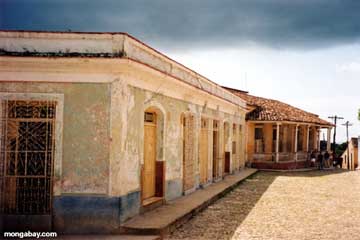Cuban Energy Crisis Solved
Cuba Energy Crisis Solved
By Joshua S Hill
July 5, 2007
Cuba may be overcoming its intermittent energy crisis, according to a top U.N. official.
Power shortages and brownouts have long been a problem in the small communist island nation, but it was daily 16 hour-electricity cuts in 2004 that finally forced the government to act. Its efforts are apparently paying off.
At a press conference in Havana Wednesday, Achim Steiner, the executive director of the U.N. Environment Program (UNEP), praised Cuba for taking big steps towards curbing wide-ranging blackouts that threatened to hamper economic growth. Although still heavily dependent on carbon-intensive gas reactors and diesel generators that send a cloud of smog over Havana each day, Cuba is today making greater use of wind and solar power.
 Havana, Cuba. Photo by P. Butler. |
“Cuba a few years ago was facing a real energy crisis, 16 hours of … electricity cuts and therefore a realization that the economy was going to collapse under this system,” said Steiner. “In terms of a short term response, it is quite remarkable how Cuba, under its economic conditions, managed to solve that crisis.”
Three years since the country endured a hot summer without air-conditioning, refrigerators or fans, UNEP has put a spotlight on Cuba’s efforts, which have included energy conservation drives, a review of the electricity grid, and nightly TV appeals from Fidel Castro. The country was among the first to fully back the swap from incandescent light bulbs to more-efficient alternatives, like compact fluorescent bulbs, with government workers going door to door changing bulbs free of charge for residents.
Castro has further argued that the present biofuel craze–aggressively being pushed by the United States and Europe–is a threat to global food supplies, a concern also echoed by Steiner.
“What President Castro points to is something the U.N. Food and Agriculture Organization has also raised recently: That there is significant potential and risk for competition between food production and production for a global biofuels market,” Steiner told Reuters during the Havana meeting. “We have to be aware that there are risks, and for some countries those risks may not be worth taking,”
Cuba’s self-proclaimed “energy revolution” has taken it towards cleaner future, though Steiner cautions that Cuba still has to reduce is reliance of leaded gasoline and diesel-fueled cars.













